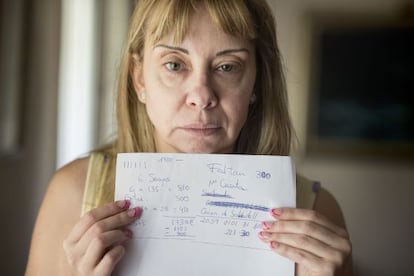Mossos d'Esquadra arrest fake botox clinic owner in Barcelona
Up to 30 women received black market treatments, with devastating results

For her 50th birthday, Lourdes Mur spent 1,730 euros to "fix" her cheekbones, forehead, chin, lips, eyebrows and the bags under her eyes. María Isabel Oliver came to her house, covered the sofa with a bedsheet, put on some gloves and spent the next four hours injecting substances into Lourdes' face. Then she scrawled some figures on a piece of white paper by way of an invoice, and left. Hours later, Lourdes received a visit from the Catalan police, the Mossos d'Esquadra.
"I said yes, of course I knew Mabel [her clients called her by this name], she had injected botox into me a couple of hours earlier," says Lourdes. Three days later, on July 2, the police arrested Mabel and her associate, Mónica Sogas, for crimes against public health, fraud, posing as professionals of the sector and harming the rights of consumers.
Mabel had not only injected botox into Lourdes, but also liquid silicone, a substance that has been strictly prohibited across the European Union for 40 years because of its carcinogenic health effects. The day after the operation, Lourdes' face was swollen and her left eyelid was drooping. Mabel's only counsel was: "Just wait, your body will absorb it."
Lourdes filed a complaint, joining another 30 women who were clients of a luxury beauty center in Barcelona, Elixir Clinic.
"Everything is in order. I just need the ramp to make it accessible to people with disabilities," Mabel told police officers when they arrived at her clinic.
Silicone in a free state creates tumors. That is why it is absolutely forbidden"
"Later she alleged that she was doing the paperwork to get the permit for the clinic," says Mossos d'Esquadra chief Jordi Domènech. But it turns out that she had no license, no qualifications for the work she was doing and furthermore that she was in possession of botox, liquid silicone and various prescription drugs, all of which had been purchased on the black market.
"We don't know where they come from, what sanitation controls they've gone through, or whether it's really botox or something else," adds Domènech.
The police shut down Mabel's clinic and believe she lied to her clients, telling them she was injecting them with hyaluronic acid, a legal product used for greater volume in lips and cheekbones.
María Isabel Oliver, who faces criminal charges, declined to speak with EL PAÍS on her lawyer's recommendation. She had two doctors working with her, Gerardo R. and Tai S. Y., who say they only handled appointments there but operated in legally licensed centers. Both continue to work at Hospital Clínic.
The police suspect that Mabel had been injecting illegal substances into women for at least a decade. At first, she found her clients via word of mouth.
"She would go to private homes and hair salons," explains Doménech. In October, 2010 she opened her own beauty center but kept doing house calls as far away as the Canaries and Ibiza. There is no accurate figure of potential victims because Mabel did not keep a list.
The first complaint against her came through a doctor who tried to undo the damage that Mabel inflicted on one of her clients a decade ago. "Botox treatments generally improve after five months, but if liquid silicone was used the effects are irreversible, because we are talking about microscopic drops that filter into the muscle tissue," says Daniel Marín, a doctor who is repairing the faces of five former clients of Mabel's, including Lourdes.
"Silicone in a free state migrates through the lymphatic channels, builds up in the lymphatic ganglia, and creates tumors called siliconomas. That is why it is absolutely forbidden," says Carlos Liébana, president of the Catalan Association of Plastic, Reparative and Esthetic Surgery.
Tu suscripción se está usando en otro dispositivo
¿Quieres añadir otro usuario a tu suscripción?
Si continúas leyendo en este dispositivo, no se podrá leer en el otro.
FlechaTu suscripción se está usando en otro dispositivo y solo puedes acceder a EL PAÍS desde un dispositivo a la vez.
Si quieres compartir tu cuenta, cambia tu suscripción a la modalidad Premium, así podrás añadir otro usuario. Cada uno accederá con su propia cuenta de email, lo que os permitirá personalizar vuestra experiencia en EL PAÍS.
¿Tienes una suscripción de empresa? Accede aquí para contratar más cuentas.
En el caso de no saber quién está usando tu cuenta, te recomendamos cambiar tu contraseña aquí.
Si decides continuar compartiendo tu cuenta, este mensaje se mostrará en tu dispositivo y en el de la otra persona que está usando tu cuenta de forma indefinida, afectando a tu experiencia de lectura. Puedes consultar aquí los términos y condiciones de la suscripción digital.








































